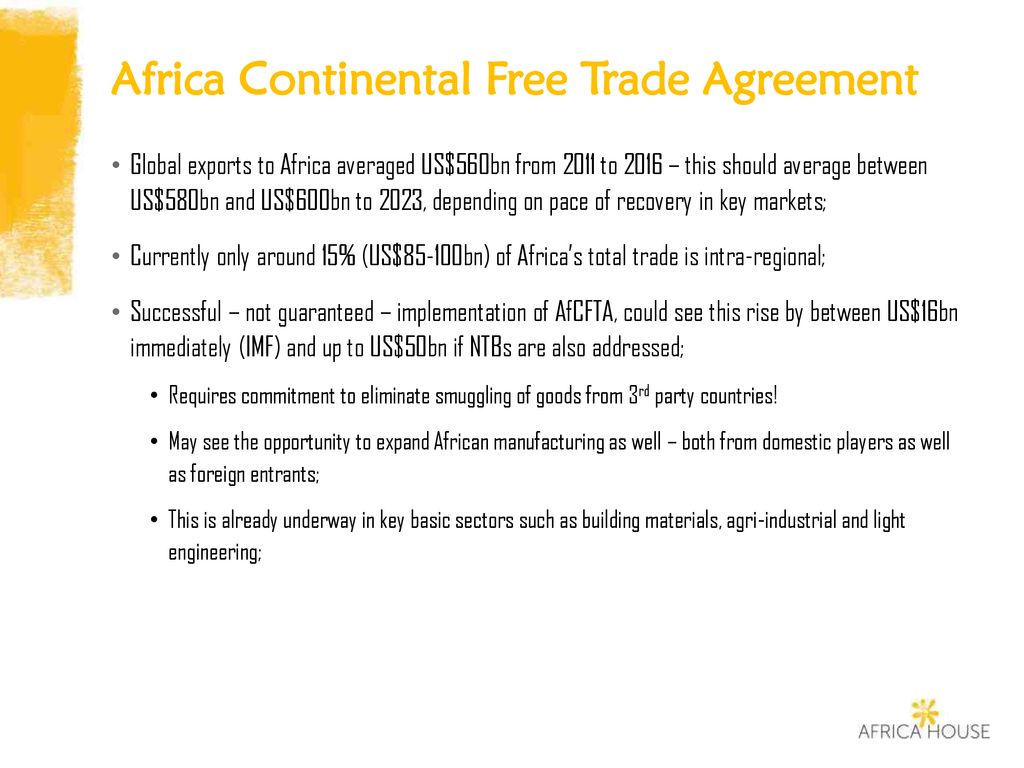A New Era of Prosperity and Unity
In a momentous step towards economic integration and shared prosperity, 54 African nations have joined hands to establish the African Continental Free Trade Area (AfCFTA), the largest free trade area globally. This landmark agreement promises to create a unified market, boosting trade, fostering investment, and accelerating socioeconomic development across the continent.

Image: trendtype.com
Unlocking the Benefits of Integration
The AfCFTA offers a multitude of benefits to its participating nations, from increased trade flows to improved economic competitiveness. By eliminating tariffs and other trade barriers, businesses can expand their reach, access new markets, and enhance productivity. This leads to a more competitive business environment, fostering job creation and economic growth.
Furthermore, the free flow of goods and services promotes greater specialization and efficiency. Countries can focus on producing what they do best, driving down prices for consumers and stimulating innovation. This economic interdependence fosters collaboration and cooperation, strengthening regional ties and stability.
The Journey to Economic Harmony
Negotiations for the AfCFTA began in 2015, with the agreement signed in Kigali, Rwanda, in 2018. Since then, countries have been gradually ratifying the agreement, with 39 currently in effect. As more nations join, the AfCFTA’s scope and impact will continue to expand, further boosting its transformative potential.
The AfCFTA is not merely a trade agreement; it is a symbol of pan-African solidarity and a commitment to creating a better future for all. It represents a collective desire to shape Africa’s economic destiny and reduce reliance on external partners. By working together, African nations can leverage their collective strengths and achieve a level of prosperity that was once out of reach.
Key Features and Provisions
The AfCFTA encompasses a comprehensive set of protocols and provisions, covering various aspects of trade facilitation. These include:
- Elimination of tariffs and non-tariff barriers on 90% of intra-African trade
- Simplification of trade procedures and harmonization of regulations
- Establishment of a common investment and competition policy
- Protection of intellectual property rights
- Dispute settlement mechanisms to ensure fair play and transparency
These provisions create a more conducive environment for businesses and investors, encouraging cross-border trade and economic integration.

Image: slideplayer.com
Sectors Poised for Growth
The AfCFTA has the potential to boost a wide range of sectors, including:
- Manufacturing: Reduced tariffs and increased market access will spur industrial development and diversification.
- Agriculture: Facilitating trade in agricultural products can enhance food security and promote rural development.
- Services: The free movement of skilled labor and harmonized regulations will accelerate the growth of the services sector.
- Tourism: Simplification of travel procedures and promoting intra-African tourism will boost economic activity in this vital sector.
- Logistics: Increased trade flows will drive demand for efficient and cost-effective logistics solutions.
By unlocking these growth sectors, the AfCFTA will create new jobs, improve livelihoods, and reduce poverty across the continent.
Addressing Challenges
While the AfCFTA holds immense promise, it is not without challenges. These include:
- Infrastructure gaps: Inadequate infrastructure can hinder the smooth flow of goods and services.
- Logistics bottlenecks: Customs procedures and border crossings can cause delays and increase costs.
- Capacity constraints: Some countries may lack the technical and administrative capacity to fully implement the agreement.
- Political instability: Conflict and political uncertainty can disrupt trade flows and undermine the AfCFTA’s effectiveness.
Addressing these challenges is crucial for maximizing the benefits of the free trade area. Collaborative efforts, capacity building, and investments in infrastructure are essential to ensure the smooth functioning of the AfCFTA.
Which Countries Signed Africa Free Trade Agreement
A Catalyst for Transformation
The African Continental Free Trade Area represents a historic milestone in the journey towards a more prosperous and integrated Africa. By removing barriers and unlocking opportunities, it has the potential to transform economies, create jobs, and foster peace and stability. With continued commitment and collaboration, the AfCFTA can be a driving force for inclusive and sustainable development, empowering Africa to take its rightful place in the global economy.






